Nation vs. Nation
Americans: This nation receives a variety of bonuses that include the opportunity to instantly build its first available Wonder, assuming it’s not the Space Program or Supercollider and no other nation is building it. In addition, they pick up a free scholar with each new university, free science research and free government, as well as military bonuses during later Ages. This is a good nation to pick, of course, when the victory conditions involve building Wonders, and in other games they’re adaptable to a variety of playing styles.
Aztecs: Their bonuses come in the military area, with a 100 percent increase in the plunder from enemy buildings, free light infantry units with each barracks you build and other advantages. This means you should concentrate on building your military and worry less about your economy and other areas of your nation. An Aztec player may want to build a large army as fast as possible, scout out the nearest opponent and attack him early, disrupting his development and maybe even eliminating him. Bring along siege units to knock down buildings and get that plunder bonus.
Bantu: With a bonus city to start with and the ability to exceed their population limit, this nation can get the engine of their economy roaring at the beginning of a game. Create that extra city immediately and establish a trade route between the two, which will quickly increase your wealth. On top of that, the Bantu can build a third city very early thanks to the fact that their cities are 75 percent cheaper to build, which means another trade route and even greater territorial control. Large national borders will keep other players penned in, but you must be prepared to face the inevitable assault. Build some towers along the borders.
British: Unsurprisingly, this nation gets double income from its taxes, builds ships faster and gains a range bonus for the arrows and other missiles fired from its forts and towers, among other bonuses. While the British advantages are a hodge-podge, they do result in a much stronger economy, although a player controlling this nation will have to produce a large number of citizens to sustain it. On the military side, Britain’s archers are among the best in the game, so use them to advantage by launching distance attacks when you assault an opponent.
Chinese: This nation can produce citizens, merchants and caravans instantly, which is important because the player in control can put those units to work much faster than his opponents can. Because citizens are the ones who gather the resources — food, metal and timber — that are vital to a nation’s early stages of development, your best bet is to produce as many citizens as you need in the beginning and send them to their tasks (don’t forget the option that allows you to designate what they should do when they become idle, which keeps them going even when you’re distracted). Your initial city gets an automatic upgrade to large, as does each new one you found, so remember that even if your military won’t be the strongest on the map, you’ll have tougher defenses to compensate.
Dutch: Commerce bonuses, including a free market and two merchants at the beginning of the game, are key here. The Dutch also receive naval bonuses, which make them a nice choice when you play on maps with water. Among their unique units are caravans and merchants that are armed, which means you don’t have to expend resources guarding them, although they’re not so strong that several enemies can’t take them out. But their defensive abilities, along with the caravan’s immunity to bribery, means you can afford to put your focus elsewhere, at least for a while.
Egyptians: You may be shocked to learn that this nation gains economic advantages and saves on Wonder-building costs, with the ability to erect two per city and start creating them an Age earlier than the other players. The Terra Cotta Army Wonder is a nice way to supplement your military if you take this nation, but don’t forget that, while putting more citizens to work constructing anything will decrease its completion time, having more than four of them on any building task actually doesn’t help as much as assigning those extra citizens elsewhere. Two citizens won’t build anything twice as fast, three won’t do it three times as fast and so forth, so don’t try to be like one of the pharaohs.
French: This nation receives a wide range of bonuses, but the most important may be the fact that supply wagons can heal their troops (they’re the only nation that can heal their troops in the field) and that they receive a free one each time they build a siege factory. When you control the French, make sure you have supply wagons bringing up the rear when you launch an assault, so that they can heal retreating troops and send them right back into battle. If you have enough troops and supply wagons, you can keep a steady stream of attackers flowing and wear down an opponent faster.
Germans: Your granary, lumber mill and smelter upgrades are 50 percent cheaper and become available sooner, in addition to an extra 10 food, timber and metal gathered by each city, which gives you economic advantages when you take charge of this nation. They will allow you to create military units much faster — that, coupled with faster-built and cheaper subs and fire ships, faster-built air units and two free fighters for each air base constructed, gives you a solid military bonus. Take your time, assemble a large military, and then unleash your assault.
Greeks: Their technology and knowledge bonuses will help you move through the ages faster, but your economy and military won’t be as strong as that of other nations. The ability to possibly be an age ahead of your opponents, however, will allow you to launch attacks with stronger units than they likely have, and you’ll probably get to build Wonders first, unless someone on the map is using the Egyptians.
Incans: The ability of your mines to generate wealth as well as metal means you don’t have to worry as much about creating merchants and establishing trade routes early on, assuming you have enough hills nearby. In addition, your wealth commerce limit is 33 percent higher than the limit imposed on other nations, and you get back 25 percent of the resources spent on a unit when it’s killed in battle, which means your economy will quickly become a powerhouse even if your military is so-so.
Indians: That’s India, not native Americans. Costs for everything rise as you move through the Ages, but this nation saves on them when it comes to Wonders, towers, lookouts and forts, with no increases for all other buildings except cities, where expenditures go up at the normal rate. Indian cities do receive an extra economic radius and caravan income is higher, so you can see that building a strong economy is key here. When it comes to the military, war elephants are cheaper and can be upgraded for free.
Iroquois: This native American tribe picks up an extra scout for each barracks built, and that unit receives free upgrades and can move through forests while all others have to go around them. In addition, both military units and scouts are hidden in friendly territory, as long as they’re not engaged in combat, and they heal at the same time. So you can see how this nation is perfect for luring in an enemy who thinks you’re off fighting elsewhere and then pouncing once they’re in deep enough that it’s too hard to get back out.
Japanese: The military is key here, with barracks units created faster and causing more damage to buildings. This gives you the ability to field a large army faster than other players, and upgraded Japanese infantry units can almost perform the same job as siege units against opponents’ buildings. Add in cheaper farms that produce more resources and you should also have plenty of citizens running around putting up more buildings, fixing anything damaged by an attack and basically making sure that an assault won’t wipe out all your units and put you out of the game.
Koreans: Sometimes the best offense is a great defense, and this nation typifies that. When you control the Koreans, you start with a temple that you can upgrade for free, which means you can gain taxation technologies faster than anyone else and start generating extra wealth, as well as automatically increase your city’s defense and borders. You also begin the game with an extra citizen and pick up three free ones when you found a second city, as well as five extra ones for each city you set up after that, which is a great way to accumulate resources faster.
Lakota: The other native American nation found in the game, the Lakota tribe is a good one to align with the Iroquois if you’re playing a team game. Their borders are invisible to enemies, and they can construct buildings anywhere in friendly territory, as opposed to being forced to stick within city limits. That gives them the ability to grab large chunks of territory quickly and confuse opponents passing through. When they venture into enemy land, they instantly destroy the farms and granaries in captured cities, which doesn’t give their opponents much of a chance to retake them.
Mayans: This nation can construct tougher buildings faster and more cheaply, and their cities (including non-garrisoned ones), towers and forts fire extra arrows. All that adds up to a nation with plenty to offer on defense. Your citizens should be better protected, especially those working near a city, and outlying buildings can weather attacks longer thanks to their enhanced armor, which means you can keep military units away on a rush longer. Just don’t linger too long and let the homestead fall apart.
Mongols: Unsurprisingly, this nation receives many offensive bonuses that emphasize the raiding side of the game. You’ll be able to create mounted units cheaper and faster, and every stable comes with a free horse archer. Add those to reduced attrition when your units hang around enemy territory and the ability to research technologies that increase your supply chain capabilities and even eliminate attrition completely, and you have the opportunity to build raiding parties capable of wreaking havoc and generally disrupting your opponents’ activities. Aim to take over enemy territory and you can increase the food bonus you receive for each 1 percent of the map that you control.
Nubians: When you control this nation, remember: “It’s the economy, stupid.” The Nubians gain many economic advantages, such as a higher rate of resource collecting by merchants, the ability to see all rare resources in explored territory and a free market to start the game. Put those to good use by getting a scout out there immediately (put him on “auto explore” and let him wander while you get busy with other tasks) to see where the best rare resources are located. When you can, research the Porcelain Tower Wonder to get even more out of those rare resources. Then amass an army, fool your opponents into thinking you have a strong economy but lousy military and strike when they least expect it.
Persians: Another nation where the economy is important, the Persians start the game with a 50 percent food bonus and gain the advantage of a second capital when they build another city, which not only grants another capital border bonus but also forces an opponent to capture both cities to defeat you in a capital elimination game. With cheaper civic research, free taxation upgrades and your caravans always running at maximum capacity, you can build a mighty economy to fund the creation of unique units that are slow but powerful. You likely won’t knock anyone out with an early rush if you control the Persians, but if you can found that second city quickly and defend it well, odds are no one else will be able to do the same to you.
Romans: Lend me your ear: this nation gets a strong national border bonus from its forts, so take advantage of it as soon as possible. Use a combination of newly founded cities and forts to push your boundaries as soon as possible, which will allow you to grab resources that a neighbor may not be able to get because she’s still busy with her first city. Assemble plenty of heavy infantry as soon as possible and make sure you place the Romans’ unique unit, the heavy infantry-killing legions, at the front of the army as you make the push into enemy territory.
Russians: An opponent infiltrates your borders and takes out some of your units, then regroups with supply wagons while concentrating on other tasks. Unless he’s a Mongol, let him sit there — one of your bonuses deals double attrition damage, with free upgrades as you earn them, so you can wear him down without sending a single unit to fight. In addition, the fact that your spies cost 50 percent less and stay hidden after using a special ability, such as bribing an enemy unit into joining your side, gives you a low-cost way to continue dealing damage without mobilizing one military unit.
Spanish: You’ll start with the map revealed and an extra scout — all of your scouts come with greater line-of-sight and free upgrades — so put that to good use by pushing out your borders to capture as many good resources as you can right from the get-go. Use one scout to check out the enemy and the other to find rare resources and search ruins, which yield extra resources when you explore them. If you play on a map with water, remember that you receive a free heavy ship every time you build a dock until you reach the Industrial Age, so use that to dominate ocean territory too.
Turks: Military power is key here, with plenty of bonuses for siege units, cheaper military research and the ability to assimilate conquered cities twice as fast. Add in cheaper citizens and you can see the pattern at work here: Get your siege factories pumping out upgraded units, hammer the closest enemy city and take it over, and then create new citizens who can repair the damage and start putting up new buildings. Move on and repeat the process, simultaneously expanding your national borders and pumping up an economy that’s fairly weak from the start. Just make sure you bring other units with your siege weapons to provide defense.
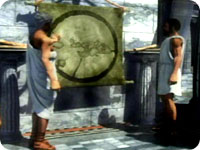
Humble Beginnings. Start with parchment, end with magnetic discs.
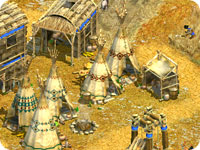
What They Call Maize. One of 18 nations in the game.
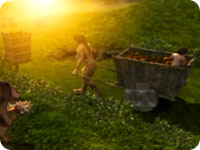
No, Labor Unions Haven’t Been Invented Yet. Put your citizens to work gathering much-needed resources.
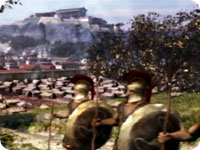
It Wasn’t Built in a Day. Enjoy your empire in all its splendor, at least until another player knocks it down.
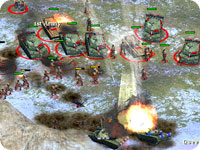
Ready, Aim … It helps to have a large army assembled before you head into armed conflict.
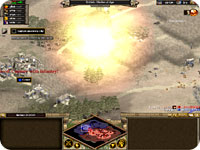
The Big One. Use the power of the nuke… wisely.
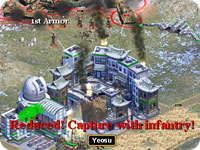
Cease Fire, Cease Fire! When you can, capture buildings rather than completely destroying them.
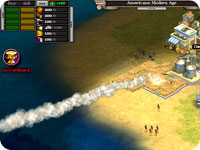
Let Me Radio in the Coordinates. A cruise missile strikes during Conquer the World.
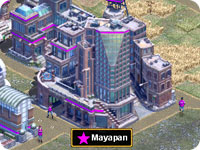
Yes, They Can. Build a bustling metropolis and thrive.

Houston, We Have an Information Age. Invest in advanced technology your nation’s people only dreamed of a few hours ago.
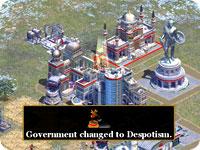
Shouldn’t Have Voted For Him. The type of government you choose has negative and positive consequences.
Stumped? Then you may need some help, thanks to the cheat codes that are commonly placed in most videogames. They allow you to, well, cheat and change the rules. This sometimes includes activating bonuses, unlocking secrets and new levels of gameplay.
To enable any of these cheat codes while playing, press the “Return” key on your keyboard, which will bring up a chat box. Type a code and press “Return” again to activate it.
The Codes
cheat bird — Create a bird where your pointer rests.
cheat die — Destroy any unit or building that your pointer has selected.
cheat finish — Automatically finish the selected item in your build queue.
cheat nuke — Detonate a nuclear explosion wherever your pointer happens to be (so pay attention to its location before you enter this code). Note that this action still drops the Armageddon countdown by one; when the counter reaches zero, all the players automatically lose.
cheat reveal — Reveal the map. (Note, however, that you can only see the terrain; the fog of war keeps you from seeing changes in enemy territory until you actually bring at least one unit there.)
cheat sandbox — Reveal the map and bring all computer opponents under your control. Force them to make stupid decisions and let you win.
cheat safe — Create a platoon of machine gunners around your capital city. Repeat as necessary.
- Mac OS X version 10.2.8
- 600MHz PowerPC G3 processor or higher
- 256MB of RAM (512MB recommended for online play)
- 32MB video card
- 1GB hard disk space
- 1024x768 monitor resolution or higher
